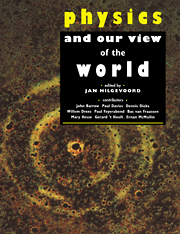
-
Select format
-
- Publisher:
- Cambridge University Press
- Publication date:
- 04 December 2009
- 03 November 1994
- ISBN:
- 9780511622823
- 9780521476805
- Dimensions:
- Weight & Pages:
- Dimensions:
- (246 x 189 mm)
- Weight & Pages:
- 0.57kg, 316 Pages
You may already have access via personal or institutional login
Book description
One of the central questions of physics is whether or not a Theory of Everything is possible. Many physicists believe that such a theory might be attainable, a belief which has led to speculation that we might one day 'know the mind of God'. But what would be the philosophical implications of having a blueprint for the Universe? In this fascinating book, a group of distinguished physicists and philosophers examine not only the claims of modern physics, but also the impact these claims have on our view of the world. Based on talks given at the Third Erasmus Ascension Symposium in The Netherlands, the book contains contributions from John Barrow, Paul Davies, Dennis Dieks, Willem Drees, Paul Feyerabend, Bas van Fraassen, Mary Hesse, Gerard 't Hooft and Ernan McMullin.At a time when many people view science with deep suspicion, this book will be of great interest to anyone wishing to explore the complex relationships that exist between physics and philosophy, theology and ideology.
Reviews
‘the articles are mostly extremely well written and make for enjoyable and stimulating reading. The style is straightforward and without scholarly pedantry and jargon; the writers let the big ideas speak for themselves.’
Source: Observatory
‘This book has a brief bibliography and a useful index. It is a challenging text, to be recommended to the many who have enjoyed the struggle to follow Stephen Hawking through his Brief History of Time .’
Charles Pereira Source: Tropical Agriculture Newsletter
Contents
Metrics
Altmetric attention score
Full text views
Full text views help Loading metrics...
Loading metrics...
* Views captured on Cambridge Core between #date#. This data will be updated every 24 hours.
Usage data cannot currently be displayed.
Accessibility standard: Unknown
Why this information is here
This section outlines the accessibility features of this content - including support for screen readers, full keyboard navigation and high-contrast display options. This may not be relevant for you.
Accessibility Information
Accessibility compliance for the PDF of this book is currently unknown and may be updated in the future.


